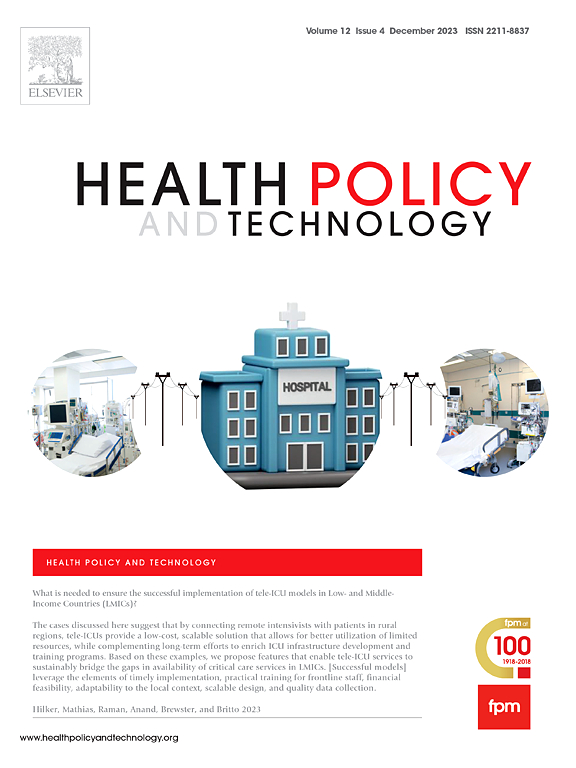当血液不再是一种选择时波兰护士对无血医学的认识
IF 3.4
3区 医学
Q1 HEALTH POLICY & SERVICES
引用次数: 0
摘要
目的输血(BT)通常是安全的,有可能挽救生命,但也有风险。世界卫生组织提倡减少不必要的输血,采用患者血液管理策略和技术。然而,为那些不愿接受与血液相关治疗的患者提供无血医疗服务却是一项挑战。这是因为医护人员对输血的观念可能与患者的观念不一致。本研究深入探讨了波兰护理人员对无血医学(BM)的态度,强调了他们的知识与患者需求之间可能存在的差距。方法我们对 202 名波兰护士进行了一项在线调查,内容涉及非血液管理技术、与 BT 和 BM 相关的风险以及护士对 BM 的教育需求。结果虽然许多护士对 BM 有一定的了解,但波兰护士对非血液管理技术的认知度相对较低:只有不到一半的人知道 BM 中使用的替代治疗方法和药物,许多人不知道与 BM 相关的各种风险或副作用。调查还显示,超过四分之三的护士认为患者应有权在知情的情况下拒绝 BT。87.1%的护士认为自己对血液管理的知识不足或很差,66.3%的护士认为自己没有做好护理需要非血液管理技术的患者的准备。将这些知识纳入护理课程对于患者的安全和福祉以及医疗保健系统的有效性至关重要。这些研究结果对医疗保健系统的潜在影响是巨大的,凸显了解决无血管理技术知识缺口的紧迫性和重要性。公益摘要虽然世界卫生组织建议使用无血管理技术,但大多数为希望避免输血的患者提供无血医疗护理的护士并不觉得自己做好了护理此类患者的准备。本研究描述了波兰护理人员对无血医疗的态度。研究表明,波兰护士不了解无血管理技术,对病人血液管理方法和无血医学中使用的药物认识不足。不过,它也揭示了积极的一面:大多数波兰护士都有兴趣拓宽自己的无血医学知识。这种提高自身技能和知识的强烈动机令人鼓舞,应加以利用,推动无血医学领域的积极变革。本文章由计算机程序翻译,如有差异,请以英文原文为准。
When blood is not an option. The awareness of bloodless medicine among Polish nurses
Objectives
Blood transfusions (BTs) are generally safe and potentially life-saving but come with risks. The World Health Organization advocates reducing unnecessary transfusions and using patient blood management strategies and techniques. However, providing bloodless medical care to patients who prefer to avoid blood-related treatments is a challenge. This is because healthcare professionals’ beliefs about blood transfusion may not align with those of their patients. This study delves into Polish nursing personnel's attitudes toward bloodless medicine (BM), highlighting the potential gap between their knowledge and patient needs.
Methods
We conducted an online survey amongst 202 Polish nurses on non-blood management techniques, risks related to BT and BM, and nurses’ educational needs regarding BM.
Results
Although many nurses had some knowledge of BM, Polish nurses’ awareness of non-blood management techniques is relatively low: while less than half knew alternative treatment methods and drugs used in BM, many were unaware of the various risks or side effects related to BM. It also shows that more than three-quarters of nurses believed that patients should have the right to make an informed refusal of BT. While 87.1 % of nurses rated their knowledge about BM insufficient or very poor, 66.3 % did not feel prepared to care for patients who require non-blood management techniques.
Conclusions
This study underscores the urgent need to educate nurses on blood conservation methods, blood substitutes, and techniques of non-blood management. Incorporating these into the nursing curriculum is crucial for patients’ safety and well-being and our healthcare system's effectiveness. The potential, impact of these findings on the healthcare system is significant, underlining the urgency and importance of addressing the knowledge gap in non-blood management techniques.
Public interest summary
Although the World Health Organization recommends using non-blood management techniques, most nurses providing bloodless medical care to patients who wish to avoid blood transfusion do not feel prepared to care for such patients. This study describes the attitudes of Polish nursing personnel toward bloodless medicine. It demonstrates that Polish nurses do not possess knowledge of non-blood management techniques, and their awareness of patient blood management methods and drugs used in bloodless medicine is low. However, it also reveals a positive aspect: Most Polish nurses are interested in broadening their knowledge of bloodless medicine. This strong motivation to improve their skills and knowledge in this area is encouraging and should be harnessed to drive positive change in the field of bloodless medicine.
求助全文
通过发布文献求助,成功后即可免费获取论文全文。
去求助
来源期刊

Health Policy and Technology
Medicine-Health Policy
CiteScore
9.20
自引率
3.30%
发文量
78
审稿时长
88 days
期刊介绍:
Health Policy and Technology (HPT), is the official journal of the Fellowship of Postgraduate Medicine (FPM), a cross-disciplinary journal, which focuses on past, present and future health policy and the role of technology in clinical and non-clinical national and international health environments.
HPT provides a further excellent way for the FPM to continue to make important national and international contributions to development of policy and practice within medicine and related disciplines. The aim of HPT is to publish relevant, timely and accessible articles and commentaries to support policy-makers, health professionals, health technology providers, patient groups and academia interested in health policy and technology.
Topics covered by HPT will include:
- Health technology, including drug discovery, diagnostics, medicines, devices, therapeutic delivery and eHealth systems
- Cross-national comparisons on health policy using evidence-based approaches
- National studies on health policy to determine the outcomes of technology-driven initiatives
- Cross-border eHealth including health tourism
- The digital divide in mobility, access and affordability of healthcare
- Health technology assessment (HTA) methods and tools for evaluating the effectiveness of clinical and non-clinical health technologies
- Health and eHealth indicators and benchmarks (measure/metrics) for understanding the adoption and diffusion of health technologies
- Health and eHealth models and frameworks to support policy-makers and other stakeholders in decision-making
- Stakeholder engagement with health technologies (clinical and patient/citizen buy-in)
- Regulation and health economics
 求助内容:
求助内容: 应助结果提醒方式:
应助结果提醒方式:


